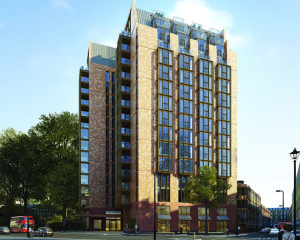
“We need to see how this market is going to settle down, and anyone who thinks he knows the answer to all these things, with all due respects, is talking out of his backside.”
So says Gerald Ronson, residential and commercial developer, philanthropist and property grandee.
Ronson was meant to be speaking to Estates Gazette about the launch of Ronson Capital Partner’s Chiltern Place, W1, its new ultra-prime Marylebone scheme.
Instead, post-referendum, the interview took a rather different turn, with Ronson and brother Laurence giving their opinion on the fast-changing outlook for prime London and the more negative impacts on the wider UK market seen over the past weeks.
“A knee-jerk reaction,” says Gerald in response to stock market slides.
“Nobody has a crystal ball. I think there has been an over-reaction in terms of the stock market and in terms of the companies that have drawn certain attention as far as the market is concerned.”
He should know. He plays for bigger stakes than most. The developer of the Heron Tower, EC2, once lost $1bn of his own money in the US in the early 1990s.
“But you know, that’s water under the bridge, you wipe yourself down and get back in the ring. That is business,” he says after 60 years in the industry.
So what are the Ronsons’ predictions for the prime residential market in the wake of Brexit – good, bad, an opportunity?
“It’s dangerous to generalise, the market is obviously in a situation where people think they can take advantage of it, there are people who are stronger holders than those that are weaker,” says Gerald.
Cautioning against generalising, Laurence says enquiries and viewings for Ronson Capital Partners’ schemes have risen in the weeks since the vote.
“You can certainly feel, in terms of talking to the agents, that the overseas market that had cooled to London has reawakened because of the sterling play,” he says.
A shift in the market also brings with it plenty of opportunity. Opportunity which has been hard to come by over the past 12 months as pricing made schemes difficult to stack up.

“The market did not warrant the risk versus reward for where it was at,” says Gerald. “We will see where the market goes.
“We are not driven that we have to do things, because Ronson Capital Partners is owned by the family trust, and half a dozen very wealthy trusts and individual friends of ours. To make money we have virtually unlimited funds available, but only if we can do things that we are confident we can make money out of.”
Laurence is relatively optimistic about the future of the market, and says there should be less negativity.
“London is a fantastic city, it will continue to be a fantastic city, and if you have best in class, you can only do well,” he says.
“London will continue to be a global city and people will still want to invest and live in London. There is lifestyle, there is education. It is very difficult to come up with somewhere else that has the same advantages.”
Gerald adds: “It is also a question of when you bought these sites. If you bought them over the past couple of years, you could well be lucky to get your money back, let alone make any profit.”
And Ronson has been around long enough to spot an opportunity, and also know when to step back.
“I do not deny the fact we are an opportunistic company,” he says. “If the opportunities are there, we will do them. If they are not, fortunately, we can do other things with our money.”
• To send feedback, email alex.peace@estatesgazette.com or tweet @EGAlexPeace or @estatesgazette










